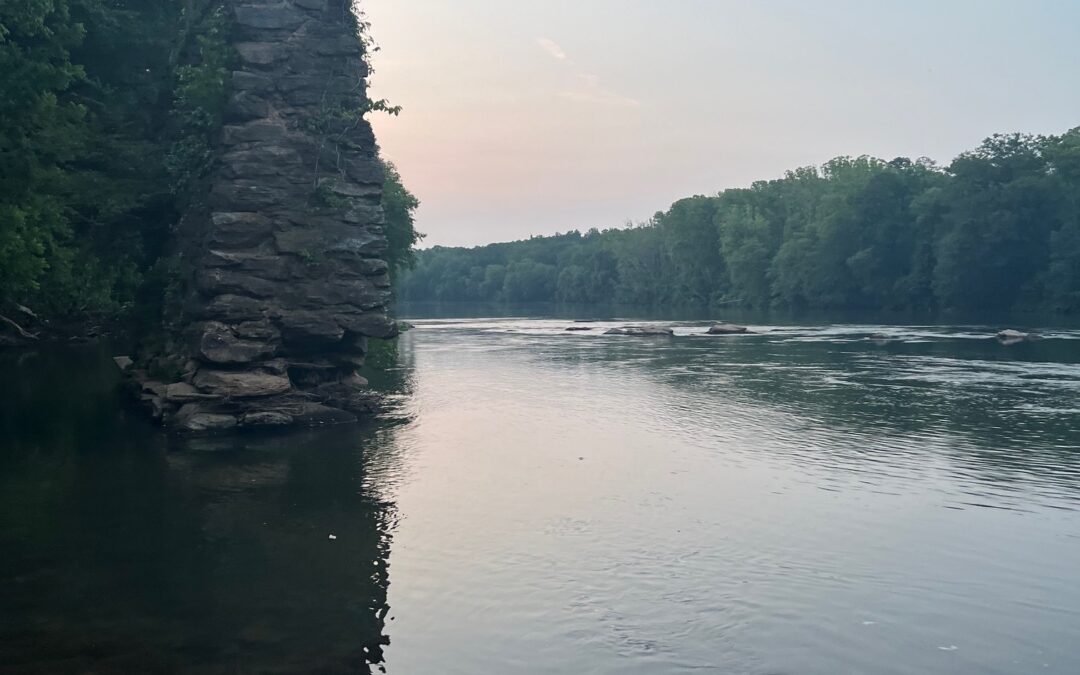Embracing the Natural
Written By: Jennifer Vieyra-Sanchez
At the wooden desk in the small lobby, smiling kindly beside a park ranger, I’ve many times heard visitors at Horseshoe Bend National Military Park say, “My, you guys are in the middle of nowhere!” A lot of times, they’re a retired couple with a camera hung around their necks, checking yet another national park off their lifetime itinerary. Other times, it’s a young adventurer, someone who’s going straight for the nature trail once we finish talking. A few times, it’s a parent, juggling pamphlets, kids, and bags in their arms. It’s a one-off observation every time, forgotten almost as quickly as the thought comes.
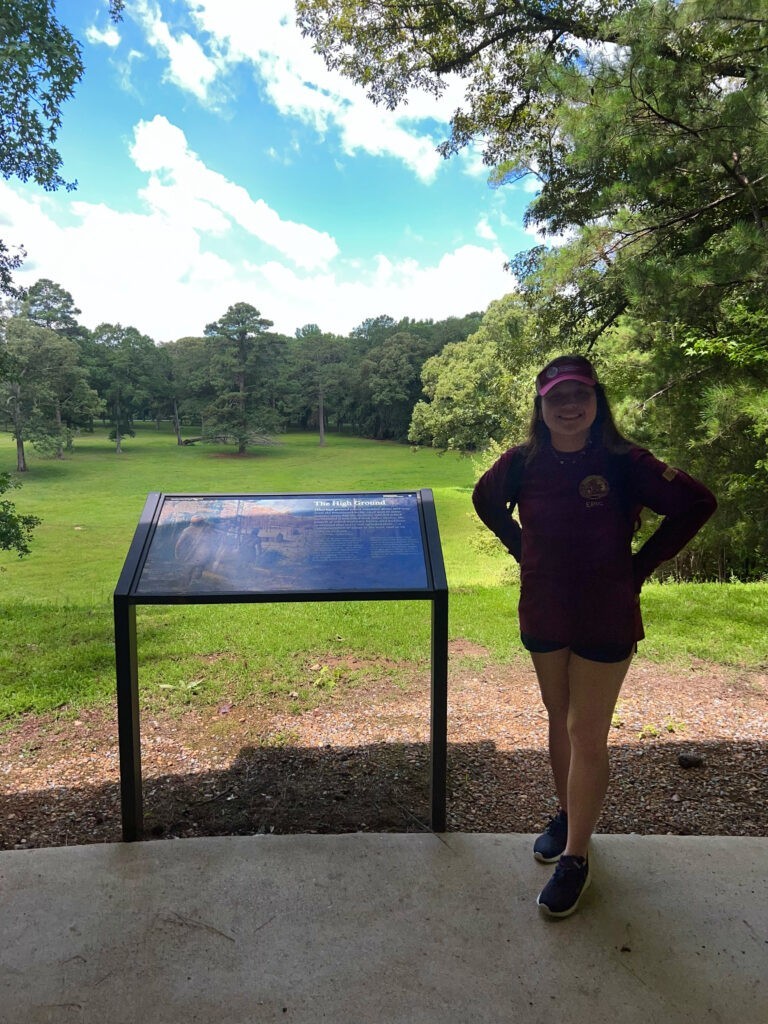
Visiting a stop on park’s tour overlooking Tohopeka village site
I remember rolling into the park one afternoon in late May, and back then, I was thinking the same thing. I’m not from anywhere glamorous, just a major city on the Gulf Coast of Alabama, yet I felt like a naïve city girl as I showed up to the “middle of nowhere.” I actually went into shock when I saw the house I’d be living in, every shadowy nook and cranny stuffed with an insect or rodent trap. Spiders as big as my palm hung from the ceiling, and daddy long-legs even bigger than that stuck to the outside of my front door. Horned centipedes (I’m not a reliable insect identifier) crept out of my floorboards in the middle of the night to surprise me in the early morning before I walked to work.
It wasn’t long after this that a beaming visitor with a knowing look walked into the welcome center and said, “There’s nothing around here! It’s just you guys!” The park ranger I’d been assisting laughed, but I felt so seen. I’d look out my kitchen window and see an endless green ocean, one that grew dark and uninviting at night. When I walked the nature trail, gnats would fly into my eyes and millions of tiny frogs would hop around my feet. The stream-monitoring crew teased me with tales of large, black snakes falling from trees onto the ground in front of them. Visitors would ramble about plants, listing off names I would never remember that they’d spotted along the riverbed on the canoe trail. The park rangers would stand still outside while running errands with me, listening to a birdsong in hopes of identifying it.
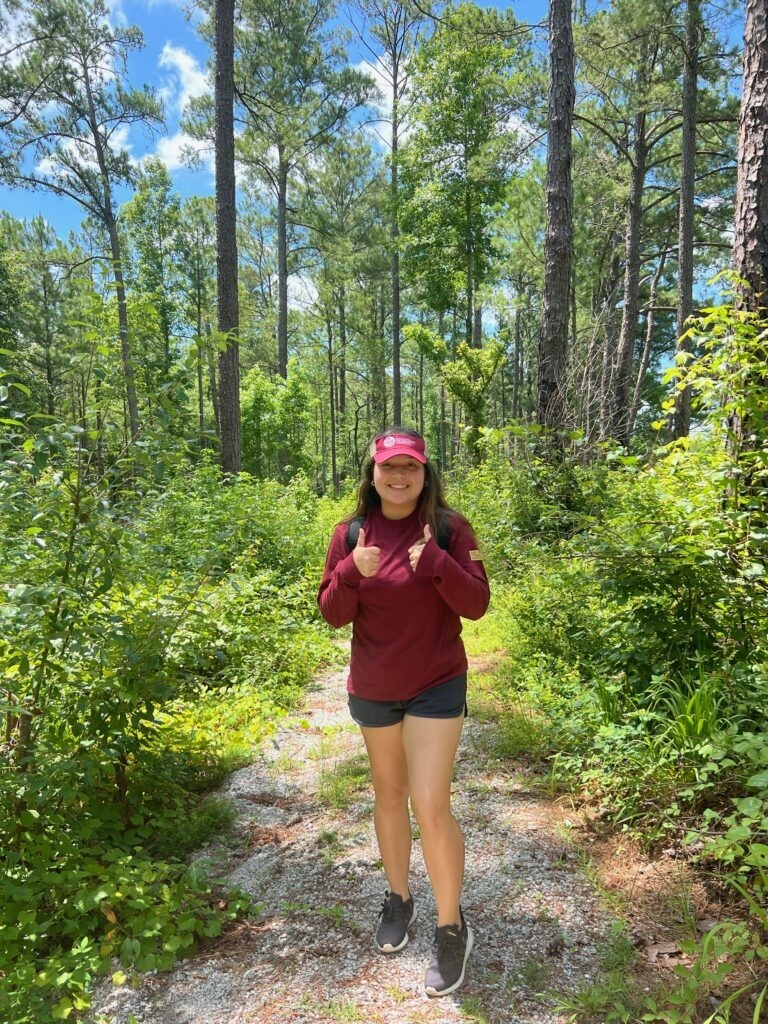
On the nature trail
I felt out-of-place. My passion is and has always been people. I was fascinated from the beginning by the history behind Horseshoe Bend. A battle took place on the land within the park, one between General Andrew Jackson’s militia and a faction of the Upper Creek called the Red Sticks. It’s not a pretty story. Around eight hundred out of a thousand Red Stick warriors died and slightly less than fifty soldiers on Jackson’s side lost their lives. Many times, we’ll show the park film to the smiling tourists, and they’ll come out somber, throwing desperate and difficult questions at us. Even then, this is what I am passionate about. I want to share the history. I want people to connect with it like I have. I want it to matter just as much to them as it does to me.
Somewhere between walking under a sunlight-speckled canopy on the nature trail and reading a dozen lengthy books on Muscogee (Creek) people, I began to change. The place that felt like the “middle of nowhere” suddenly burst with life. I was looking at my surroundings with new eyes, seeing past the time the timber industry cut down all of Alabama’s trees, permanently changing the landscape, and past the time plantations tilled the land for cotton. I was living somewhere that had once been everything to the Muscogee people, horned centipedes and all. It had been a place with bustling towns full of chatter, laughter, and music. Even presently, there’s many people who call this area home, and I drive past their spaced-out, open-field houses on my half-hour commute to the supermarket. I realized that if other people can find a place here — can call it home — I can, too.
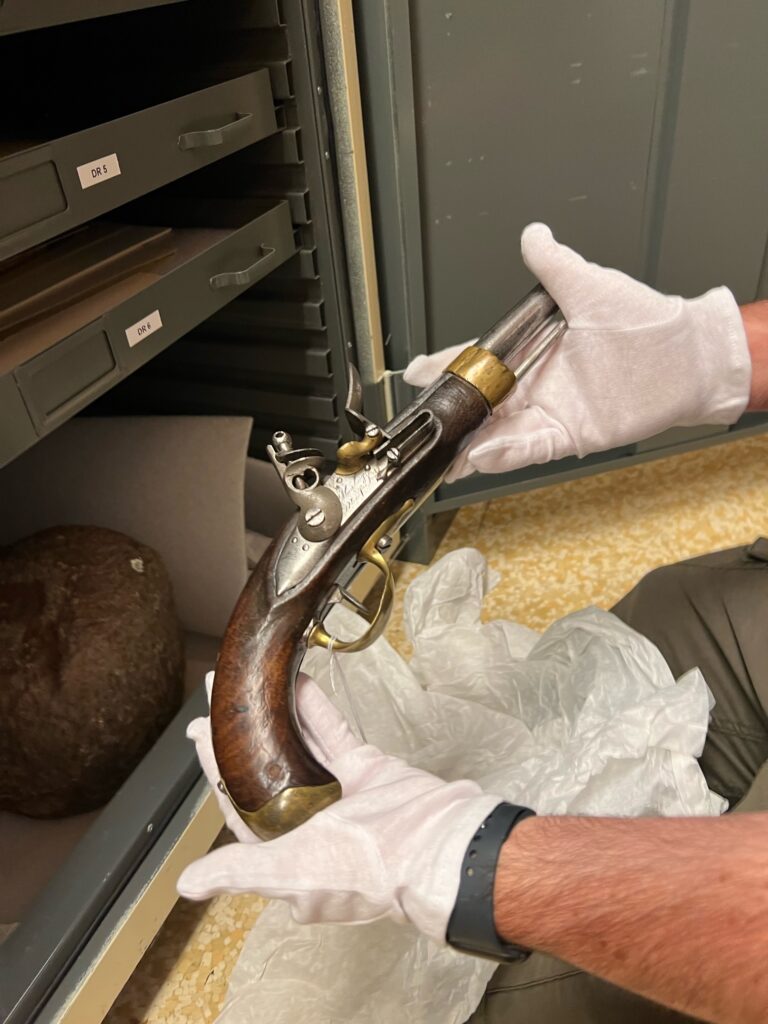
Park ranger shows off pistol in museum collection
A lot of times, I find myself applying lessons I learned during my last semester of college to the situations I find myself in here at Horseshoe Bend. Since I am studying abroad next school year, I had to take a class that teaches how to deal with culture shock, living independently, feeling homesick – all things I have experienced just four hours north of my home city. I kept a lot of those teachings in mind, such as only calling family after an emergency has been dealt with to avoid widespread panic. That was something I practiced on my second day at the park after I accidentally locked myself out of my house and it started to rain.
One thing I forgot until recently, however, is that, as a traveler or – even better – as a guest, I have to adapt to my surroundings, not the other way around. It sounds straightforward and obvious. When I heard it in class, I didn’t think much of it. Still, here I was, wondering if the maintenance crew could spray my house with pesticides to rid it of every single critter. I was driving out of my way to reach restaurants I recognized instead of unfamiliar local diners. When I walked on the nature trail, I ducked away from everything that buzzed near my ears, upset that my insect repellent didn’t seem to be working. I was avidly trying to mold the world around me to my taste. I tried to turn the “middle of nowhere” into something that even somewhat resembled my city.
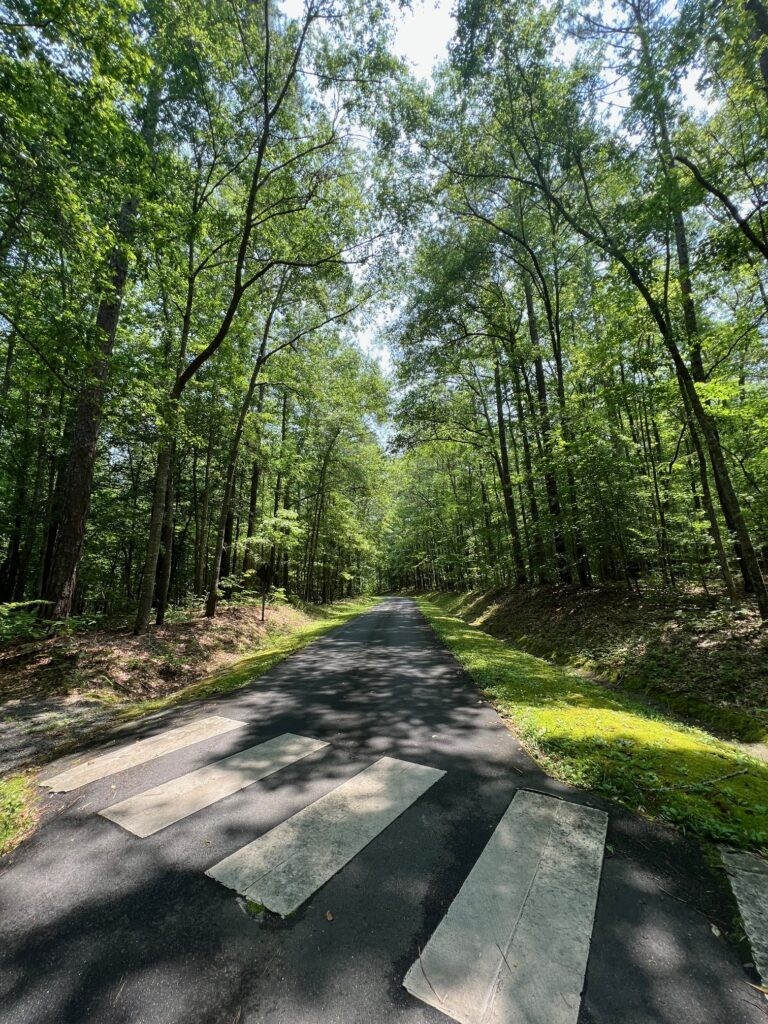
Nature trail intersecting the tour road
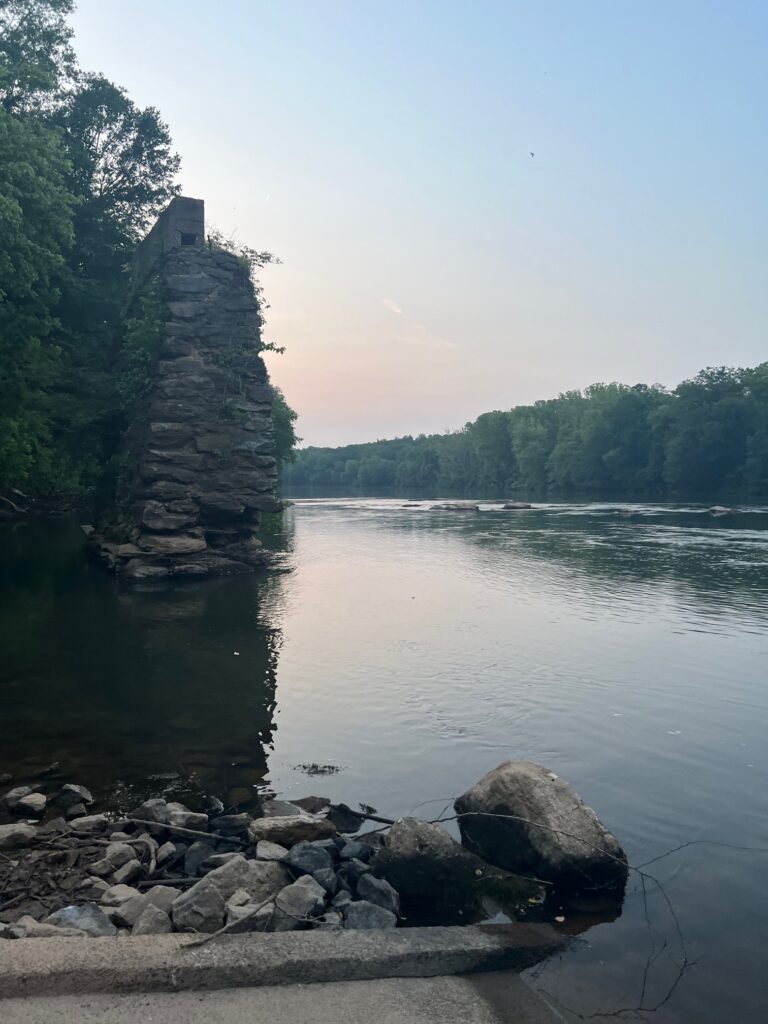
Tallapoosa River from boat ramp
I like to think I’ve adapted now. When I caught a small slug crawling out of my backdoor’s frame towards some crumbs I’d left near the trashcan in my kitchen, my first instinct was to spray it with insecticide. As I watched it eat peacefully, though, I couldn’t bring myself to do it. Then there was the dead cockroach on my porch, its carcass a tell-tale sign of what the cluster of daddy long-legs above my door get up to at night. Some spider that snuck into a corner of my hallway caught the annoying, light-seeking bugs that flew through my door one evening and tapped at my ceiling light for hours. It became clear that I didn’t have a choice in sharing my house, but I was finally starting to see that it wasn’t detrimental to me.
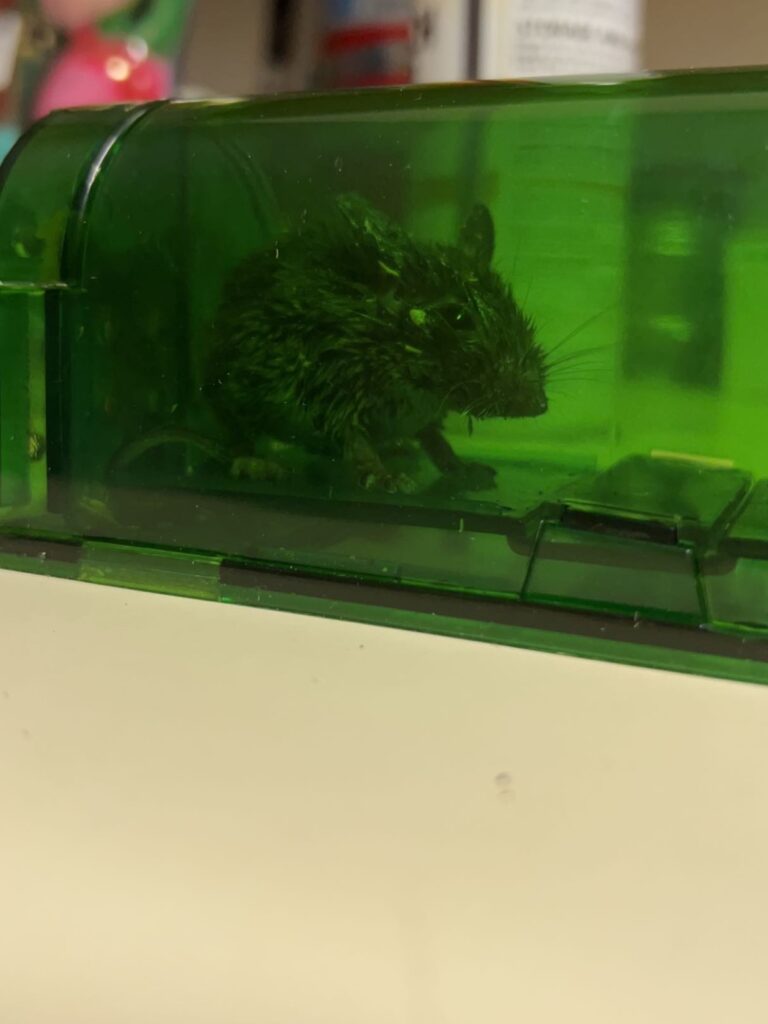
A mouse caught in the humane traps I put down
There’s a lot that I am getting out of this program. At work, I learn much about the park’s history through the books I read as well as listening to park rangers interpret the story for visitors and reviewing the museum’s collection during inventory. I follow along with tours, noting the differences in what a military staff ride focuses on versus a youth group from Muscogee Nation. The staff tells me the various ways they got into the National Park Service, broadening my mind with possibilities for my own future. Even so, I spend an equal amount of time off duty. I walk five minutes to my house in the evening and settle into my nighttime routine. Everything is so different from what I was used to, yet I often forget I’m somewhere “new.”
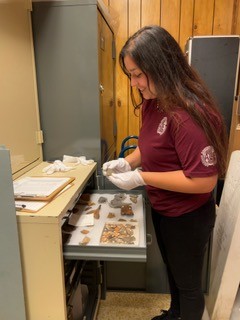
Participating in routine inventory for museum’s collection
This might not be what ACE programs are specifically about, but the move has felt like a big part of it for me. I’m sure it’s the same for many other people, and I hope reading about what it’s been like for me can help somebody else. It’s not always easy to adjust after a big or small move. I’m truly grateful for this experience because I know I’m coming out the other end as a different person. I still have some time left here, and I am excited to live it out with a newfound trust towards my current home.
